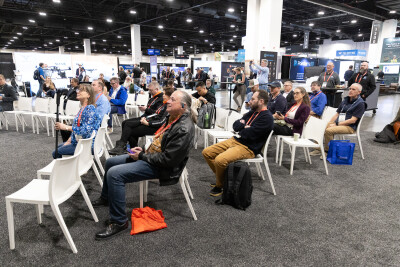‘It’s all about actionable information. Action without informed decision-making is not very good.’
ORLANDO – Hexagon CEO Ola Rollen took the opportunity of his company’s annual user conference to meet with reporters and analysts over a semi-casual lunch and answer wide-ranging questions about the company’s direction. The verdict: Rollen has a vision for Hexagon that combines hardware and software to provide “actionable information” by building on its current suite of technologies.
By way of example, Rollen offered, “It’s fairly essential if you’re drilling a hole through the Alps, and someone is drilling a hole from the other side, that you meet in the middle.” The role of Hexagon’s Leica Geosystems and the rest of the company’s many brands is to help customers make sure that tunnel meets in the middle.
“Action without informed decision-making,” Rollen said, “is not very good.”
Does he agree, then, he was asked, with companies like FARO that the market for 3D laser scanning can be significantly broadened?
“I won’t comment on competitors’ actions,” he said, “because I think that’s rather low,” but he did say that he would be wary of competing in the German market, for example, without very accurate laser scanners.
Is price important in driving the scanning market? “It’s accessibility, so yes,” Rollen said, “the further you reduce the cost, the more benefit to the industry.” However, he said, “the misconception is that the cost comes in the form of the hardware. It doesn’t’. It’s in the software and the processing side of things. That’s where the cost is.”
Further, he said, “Leica is the Mercedes Benz, the BMW, in geomatics,” and it’s unrealistic to think one would enter the market with Leica. Rather, going by Hexagon’s “good, better, best” view of the market, it might make more sense for companies to enter geomatics with something like Hexagon’s GeoMax positioning brand.
Companies should “aspire to Leica,” he said.
“We need to be top-notch in the best,” Rollen said by way of explanation, “and then we have to have something that can compete in the low-end market … We haven’t been great at that.”
This approach will also help Hexagon tackle emerging markets, which Rollen believes are growing at roughly double the rate of mature markets in today’s economy. “It’s been a fairly favorable recovery in the US and Europe up till now,” he said, “but it’s getting tougher to get growth there.” He likened the economy in mature markets to an inflatable ball in a pool: If you drag it to the bottom, it will pop quickly back to the top, but then it will stay steady at the surface.
Investing in emerging markets, he said, where growth is more easily attainable, is the only way Hexagon can go from a 2.2 billion Euro company to a 3.5 billion Euro company in the next four years, as is his goal. He intends to move the company’s EBIT from 20 percent to 25 percent, as well.






